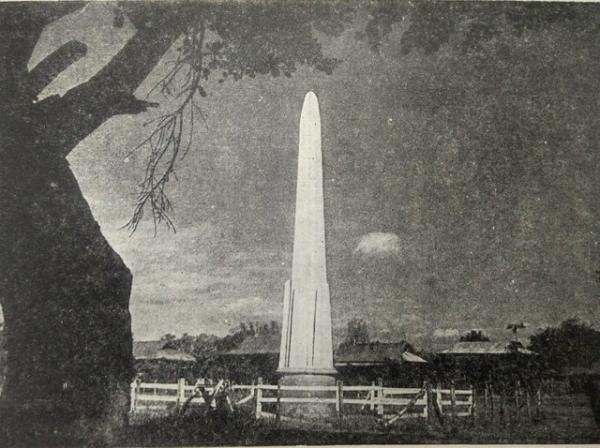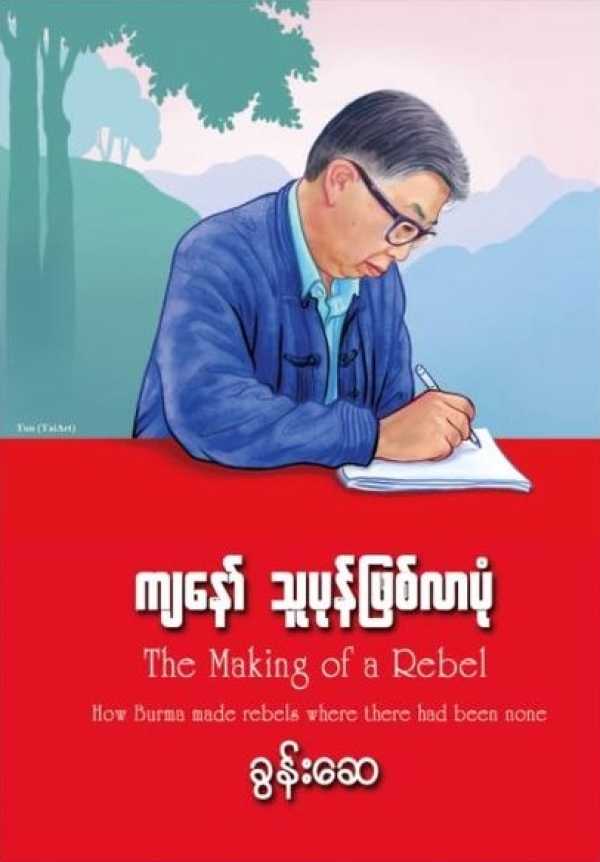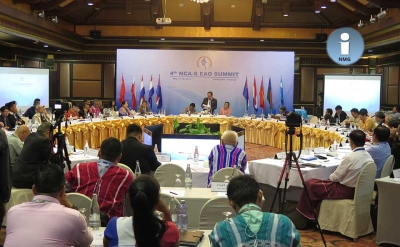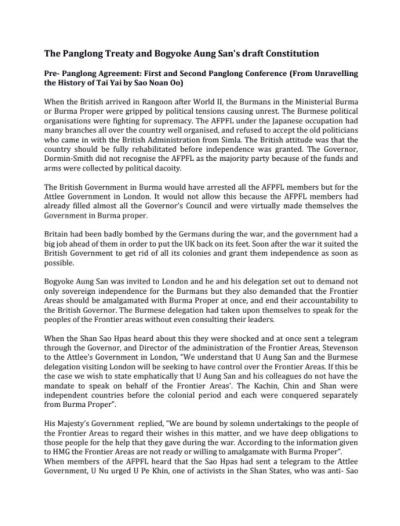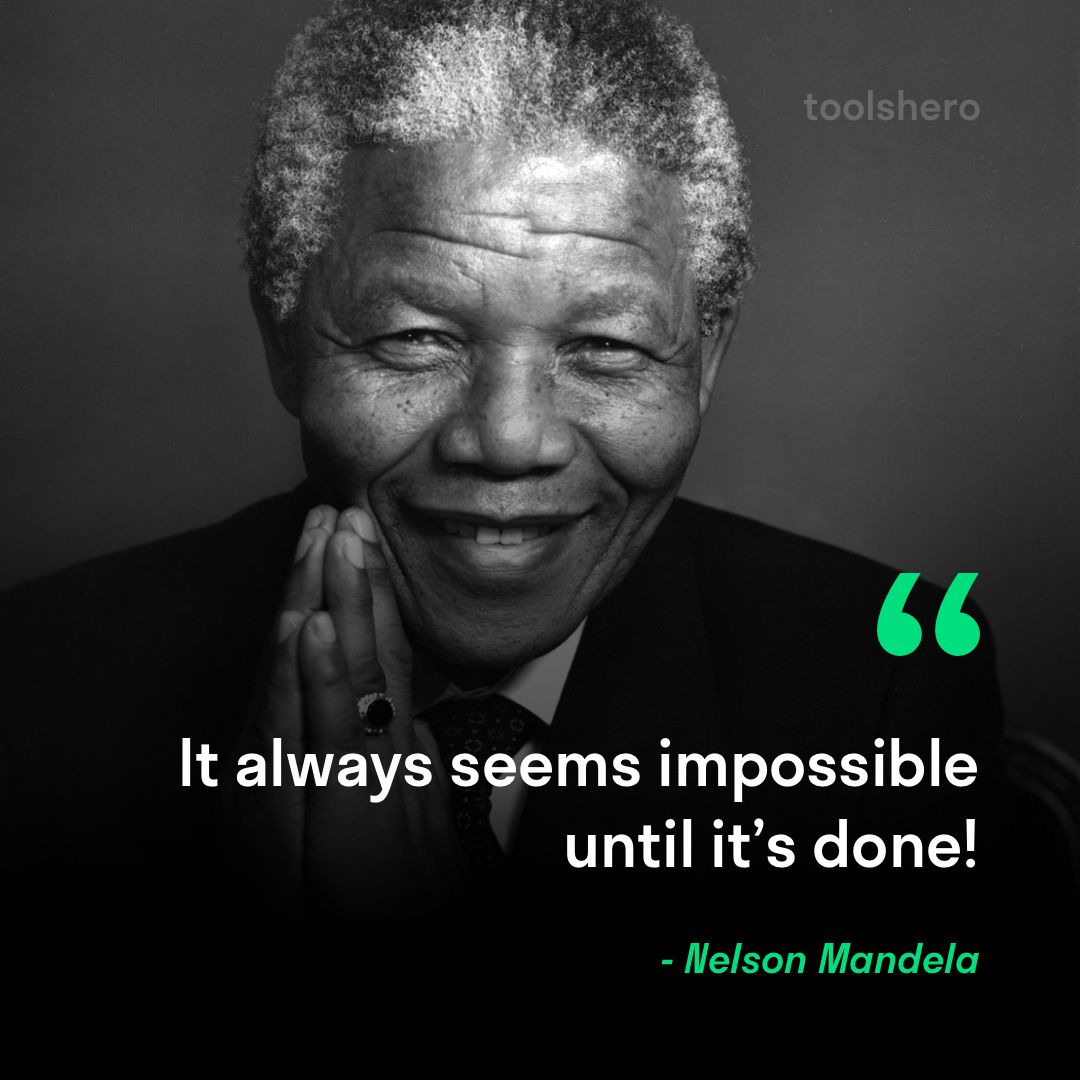 Pyidaungsu Institute
for peace and dialogue
Pyidaungsu Institute
for peace and dialogue

OPINION (24)
Myanmar's Federal Dream and its Political Dilemmas
Written by La Nan Friday, 01 July 2022 20:04This paper will examine political culture and mindset that shape and break the federal dream and discuss the best possible model for federalization in Myanmar.
This publication was part of a-four-year research project “Drugs & (Dis)order: Building sustainable peacetime economies in the aftermath of war”, funded by the UK government’s Global Challenges Research Fund (GCRF).
Since 14-18 May, when the NCAS-EAO Summit 4/1 was held in Chiangmai, a number of comments have come out on the decision of the Karen National Union (KNU) to quit the Peace Process Steering Team (PPST) and form, what it calls, the Peace Process Consultative Meeting (PPCM). Without sufficient data and premises, some of them have been quite malicious.
The Panglong Treaty and Bogyoke Aung San's draft Constitution
Written by PI Monday, 11 June 2018 14:46When the British arrived in Rangoon after World II, the Burmans in the Ministerial Burma or Burma Proper were gripped by political tensions causing unrest. The Burmese political organisations were fighting for supremacy. The AFPFL under the Japanese occupation had many branches all over the country well organised, and refused to accept the old politicians who came in with the British Administration from Simla.
After I had read it the first time, I said to myself: Now you’re a toothless tiger and over the hill. Time to make way for the young ones.
There are at least 3 reasons to read this book, written by a scion of the one of the 34 noble houses of the former Federated Shan States, Lawksawk.
Back to the Land of the Enchanted Mistress
Written by PI Friday, 20 April 2018 01:20This was my second visit to the United Kingdom, that Vladimir Peniakoff aka Popski (1897-1951) of Popski’s Private Army (PPA), a famous fighting unit during the Second World War had affectionately called the Land of the Enchanted Mistress (“as a boy, having loved (her) and broken away, will go on loving her memory all his life”) in his memoirs.
Learning to share#29: The PPST Emergency
Written by PI Wednesday, 17 January 2018 15:45An emergency meeting of the Peace Process Steering Team (PPST), the leading organ of the 8 signatory EAOs, was therefore held to assess and decide how to handle the situation.
Learning to Share: The 9th Asian Informal Drug Policy Dialogue
Written by PI Saturday, 06 January 2018 01:52Since the last Shan Drug Watch annual report was published in June 2012, I have written only a few articles on the drug situation in Shan State. One obvious reason was the reconciliatory climate required by the peace process didn’t go well with the hostile nature of the drug issue. Another reason, equally compelling, was I no longer have time and resources to continue my involvement in the subject.
Learning to share: Euro-Burma Office (EBO) 20th anniversary reception
Written by PI Saturday, 23 December 2017 00:47On the surface, it was going to be just another birthday party. What drew (and did not draw) people to attend the event was HarnYawnghwe, the EBO’s executive director, who early this year had been, in effect, served with a persona non grata status by the Aung San Suu Kyi government.
More...
Learning to share: NCA-S.EAO Preparatory Meeting for UPC 21CP#3
Written by PI Friday, 22 December 2017 01:05The NCA signatories’ meeting to prepare for the upcoming Union Peace Conference (UPC#4), according to the NCA, or the Union Peace Conference 21st Century Panglong (UPC21CP) #3, according to the government, was held in Chiangmai, 14-18 December.
To Hopeland and Back: The 34th trip
Written by PI Tuesday, 12 December 2017 00:07This time, my main purpose was to take part in the Sino-Myanmar Scholars Informal Meeting, which was on 27 November.
This is the second such meeting that I have the honor to attend. The first was on 6 April 2017, that I have already reported in To Hopeland and Back: The 29thtrip
Learning to share: The 16th meeting of the Peace Process Steering Team (PPST)
Written by PI Wednesday, 22 November 2017 14:58The meeting is the first since 9-10 October 2017 which was held in preparation for the ceremony to be held in Naypyitaw on 15 October 2017 in commemoration of the NCA signing two years earlier.
Learning to Share: Great Lords of the Sky #2
Written by PI Friday, 03 November 2017 00:23I have already reported on the first part: Historical background. Part Two: Guardians of the Shan Plateau talks about the Saohpas (“Lords of the Sky), the rulers of the Shan State’s former princedoms.


